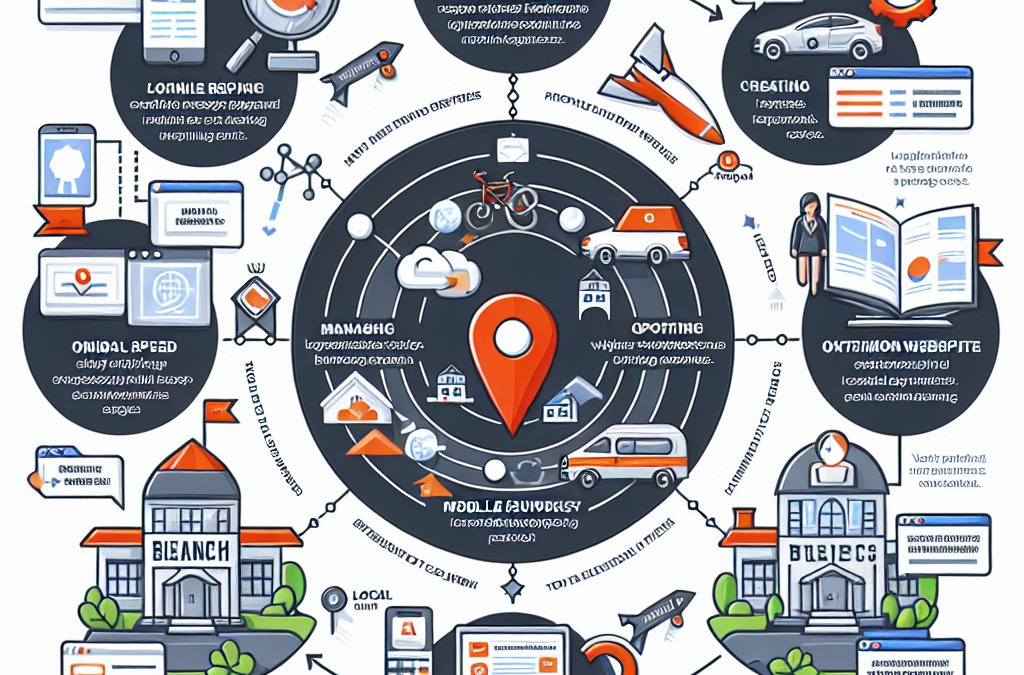Understanding Local SEO
What is Local SEO?
So, let’s kick things off by talking about what local SEO really is. It’s all about optimizing your online presence so folks in your community can find you easily. Think of it as a digital megaphone that helps your business stand out in local search results. It’s crucial for small businesses that thrive on local clientele.
Now, why is this important? Local SEO helps connect you with customers in your area who are searching for what you offer. Whether it’s a cozy café or a plumbing service, people tend to look for local options first. Without a proper local SEO strategy, your business could get lost in the vast sea of the internet.
Simply put, if you want your business to shine and attract local customers, understanding the ins and outs of local SEO is your first step. It’s not just a trend; it’s a necessary strategy in today’s competitive digital landscape.
Why Local SEO Matters
Now that we’ve covered what local SEO is, let’s dive into why it matters. Local searches often lead to actual foot traffic and sales. Stats show that a significant number of local searches result in a purchase within a day. When your business appears on the first page of local search results, you’re not just getting visibility; you’re getting potential customers who are ready to buy.
Moreover, local SEO offers an advantage over larger brands that may not have a local presence. By focusing your efforts on local SEO, you can compete based on relevance and proximity rather than just brand recognition.
So, if you want your small business to thrive, local SEO isn’t just an option; it’s a necessity. Ignoring it means potentially losing out on a huge chunk of your market.
Key Components of Local SEO
When we talk about local SEO, we’re looking at some key components that you need to focus on. First off, there’s your Google My Business (GMB) listing—a crucial tool for local SEO success. It not only helps you show up in local searches but also allows you to share important information like your address, phone number, and business hours.
Then, we have local keywords—those are essential for focusing on your specific area. Using keywords that include your city or neighborhood will help Google understand where you operate. Additionally, local backlinks from other reputable local websites can greatly enhance your domain’s authority.
Lastly, online reviews play a massive role. They not only influence your reputation but also contribute to your local search ranking. Encouraging happy customers to leave reviews can give you that extra edge you need over your competition.
Optimizing Your Google My Business Listing
Claiming Your Listing
First things first, if you haven’t already claimed your Google My Business listing, do it right now! It’s super easy to get started—simply search for your business on Google, claim it, and prove that you’re the owner. Once you’re in charge, the real fun begins.
Complete every bit of information you can. People need to know your address, phone number, website, and business hours. The more thorough your listing is, the more trust you build with potential customers. If someone sees a listing that’s just half-done, they’re likely to skip over you.
Don’t forget to add some high-quality images of your business! A shiny photo of your storefront or a mouth-watering dish you serve goes a long way in catching attention. Visuals can make or break first impressions—make sure yours are top-notch.
Regular Updates and Posts
Keeping your GMB listing up to date is essential. Google loves fresh content, and so do your customers! Regularly updating your listing with new content, like seasonal hours or special promotions, can keep your audience engaged.
Using Google Posts is a nifty feature that allows you to share news, offers, and events directly on your GMB profile. It’s a great way to grab attention and drive traffic. I often share updates about new menu items or customer appreciation events to keep the excitement rolling.
This ongoing engagement shows Google that you’re active and involved, which can help improve your rankings in local searches. So, make posting on GMB a regular part of your marketing strategy!
Encouraging Customer Reviews
I can’t stress enough how important customer reviews are. They can seriously boost your visibility and credibility. We all know that a good review can sway a potential customer’s decision, right? After a purchase, follow up with customers and kindly ask them to leave a review if they were satisfied.
Responding to reviews, both positive and negative, is equally crucial. A quick “thank you” for a positive review can enhance customer loyalty, while addressing negative feedback shows that you care about improving your service. This interaction also helps build trust with future customers.
Moreover, having a higher quantity of positive reviews can improve your ranking on Google. So, be proactive in encouraging and managing reviews, and watch how your rankings climb!
Using Local Keywords Effectively
Finding the Right Keywords
The backbone of any SEO strategy is keywords. For local SEO, it’s about finding the right local keywords that resonate with your target audience. Tools like Google Keyword Planner or Ubersuggest can help identify keywords that people in your area are searching for.
Think about the phrases people might use to find your services. It’s often as simple as adding your location to the keywords. For example, if you own a bakery, targeting “best bakery in [your town]” can yield great results.
This is where some good research comes in handy. Check out what your competitors are ranking for and see if you can incorporate similar terms to improve your own rankings.
Integrating Keywords into Your Content
Once you’ve got your local keywords sorted, the next step is integrating them carefully into your content. You don’t want to shove them in just anywhere, though—that’s called keyword stuffing, and it can do more harm than good.
Focus on naturally inserting these keywords into your website copy, blog posts, and, of course, your GMB listing. This not only helps with optimization but keeps your content reader-friendly. You’re creating content for people, not just search engines.
And don’t forget about meta descriptions and image alt texts—these are often overlooked but can help with local SEO as well. Put those keywords to work for you in every corner of your online presence!
Monitoring Your Keyword Performance
Monitoring your keyword performance is like checking your progress in a marathon. Use tools like Google Analytics or Search Console to track how well your local keywords are performing. Are they ranking well? Are people clicking on those search results?
If certain keywords aren’t performing as you hoped, it may be time to tweak your strategy. Maybe they’re not resonating with your audience as much as you thought. It’s all about testing and optimizing until you hit the sweet spot.
Staying on top of this ensures that your local SEO stays sharp and effective, giving you the best chance at those first-page rankings!
Building Local Citations and Backlinks
What are Local Citations?
Local citations are any online mention of your business—think directories, review sites, and social media. They’re essential for local SEO because they help Google confirm that you’re a legitimate business. Get those citations lined up, folks!
Start with major directories like Yelp, Yellow Pages, and even local chamber of commerce websites. Ensuring your name, address, and phone number (NAP) are consistent across all platforms is key. Any discrepancies can confuse search engines and hurt your ranking.
Additionally, local citations can also improve your visibility in local search results. The more places customers can find your business information, the more credible you appear in Google’s eyes.
Getting Quality Backlinks
Backlinks are like votes of confidence from other websites linking back to yours. The more quality backlinks you have, the better your site’s authority becomes. Aim to get links from local news outlets, business partnerships, or community blogs. Those connections can boost your visibility tremendously!
Participating in local events, sponsoring local teams, or even guest blogging on popular local sites can help you secure those valuable backlinks. Each link enhances your online presence and signals to Google that you’re a trusted business.
However, be sure to focus on quality over quantity. A few links from high-authority sites can be way more beneficial than a ton from lower-tier ones. It’s worth putting in the effort to build those valuable relationships.
Tracking Your Citations and Backlinks
So, you’ve set up your local citations and started building backlinks—what’s next? It’s vital to monitor these over time. Tools like Moz or Ahrefs allow you to check your backlink profile and ensure your citations remain consistent.
If you notice any issues or outdated info, it’s time to go back and fix those inconsistencies. Keeping everything up-to-date ensures you maintain credibility with both Google and your customers.
Ultimately, this ongoing effort keeps your local SEO strategy robust and effective in achieving first-page rankings. You’ve laid the foundations; now, it’s about maintenance and growth!
Monitoring Your Local SEO Performance
Using Analytics Tools
The last piece of the puzzle is monitoring. You’ve put all this effort into your local SEO strategy, so it’s essential to keep an eye on how it’s performing. Google Analytics is your best friend here, offering insights into your site traffic, conversion rates, and more.
Make sure to set up your goals appropriately—track how many people are clicking to call or filling out that contact form. This information helps you understand which strategies are working and which may need some tweaking.
Moreover, monitoring your rankings in local search results will help you identify trends. Do certain strategies yield better results during specific times of the year? Knowing this can help you plan future marketing efforts!
Evaluating Customer Engagement
Keep track of customer engagement as well. Check metrics like click-through rates, social media interactions, and customer feedback. These numbers give you a glimpse into your audience’s behavior and preferences.
If you notice some content resonates better than others, consider producing more of that type. It’s all about listening to your customers and adapting your strategies accordingly.
Engagement isn’t just about numbers; it’s about creating a connection. The more you engage with your audience, the better you’ll understand their needs, ultimately leading to improved sales.
Adapting Your Strategy
No strategy is set in stone! The digital landscape is always evolving, and so should your local SEO approach. Based on your monitoring efforts, be prepared to pivot your strategies for the best outcomes.
Experiment with different approaches. If one strategy isn’t producing results, try out something new. Whether it’s altering your keyword focus, updating your GMB posts, or seeking new backlink opportunities, always strive for improvement!
Staying flexible allows your local SEO strategy to keep pace with changes in technology and consumer behavior. You’ve got this—and adapting means you’ll continually climb those ranks!
Frequently Asked Questions
What is local SEO?
Local SEO is a strategy that helps businesses improve their visibility in local search results, making it easier for customers in their area to find them online.
Why is Google My Business important for local SEO?
Google My Business helps businesses manage their online presence across Google, allowing them to appear in local searches and providing potential customers with essential information about their services.
How can I improve my local SEO rankings?
Improving your local SEO rankings can be done by optimizing your Google My Business listing, using local keywords effectively, encouraging customer reviews, and building local citations and backlinks.
What are local citations, and why are they important?
Local citations are mentions of your business’s name, address, and phone number on various websites. They are essential for verifying your business’s legitimacy and improving your local SEO rankings.
How do I track my local SEO performance?
You can track your local SEO performance using tools like Google Analytics to monitor traffic and conversions and by using ranking tracking tools to check how well your website is performing in local search results.


